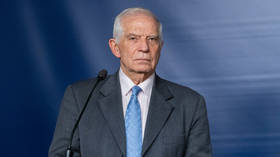Libya: Time of change, or oil discounts?
As the “Friends of Libya” conference kicked off in Paris, debate is growing over whether world leaders are seeking to rob the country of its assets or lend a hand to the people of Libya in their struggle for democracy.
RT turned to experienced diplomats to examine what the conference in Paris may bring to Libya. Oliver Miles, the UK’s ambassador to Libya in 1984, hopes that the international community will unfreeze the billions of dollars in frozen Libyan assets and take all measures to prevent a humanitarian disaster. “Libya is a very unusual economy,” he said. “It depends entirely on oil production and the money coming from oil sales. Right now, there is no money coming from oil sales, because there are none of them, and they have no ability to touch their oil reserves. The second point about the Libyan economy is that a huge proportion of the workforce has been employed by the state. Right now, the state cannot pay them. If this situation continues, it will lead to a collapse.” Miles strongly believes that the Libyan people now have a chance to build a decent new country.“It is really time they had a break” from over 100 years of dominance, first by Mussolini and then by Gaddafi, he stated. A far different stance was taken by Mohamed Hassan, a former Ethiopian diplomat. Hassan says that the “Friends of Libya” conference in Paris has nothing to do with the interests of the Libyan people. “It is just a conference to redistribute the wealth of Libya. It is not self-determination of the Libyan people,” he told RT. “I don’t see any change for the Libyan people.”The former diplomat hopes the Libyans will continue “resistance to NATO’s forces” to stop “the international robbery” of the country in what he called a general “re-colonization of Africa.”
Washington-based scholar Ivan Eland says oil is always in the background.
“I think France might have been out after the oil – and… they are going to get the oil,” he said. “Also, France was desiring to improve its status in the world.”














